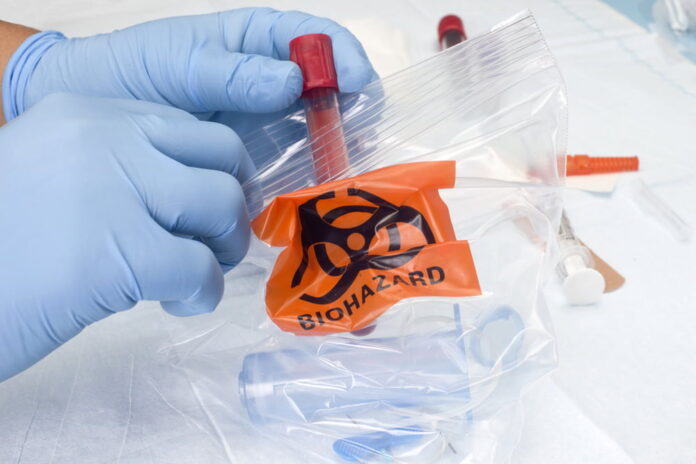Is blood a biohazard? When it comes to blood, you should treat it should be treated as a biohazard. Why? You could easily expose someone to bloodborne diseases by accident.
Even if someone washes their hands and wears gloves, they can create blood diseases if they don’t follow proper protocols.
Need to dispose of blood? To ensure no one gets infected, visit our biohazard disposal Scarborough location. We’ll take it away and ensure it goes where it needs to go.
Keep reading to learn more about the reasons why blood is a biohazard.
Why Is Blood a Biohazard?
Blood is considered a biohazard for several reasons:
Blood Can Contain Infectious Agents
Blood can contain various infectious agents, including viruses, bacteria, and parasites. These agents can be spread through contact with contaminated blood, infected body fluids, or by inhaling or ingesting contaminated items.
Infection can occur when the infectious agent enters the bloodstream and begins to reproduce. It can occur from direct contact with infected blood and other body fluids or items contaminated by an infected person or animal. Click here to learn more about Bloodborne Pathogens, transmission methods, exposure, safety considerations, etc.
Blood Can Be Difficult To Clean
Blood can be difficult to clean, especially from fabrics or porous surfaces, because it contains proteins that bind to the fibers or porous materials. These proteins can cause staining, especially if the blood has been allowed to dry before cleaning begins.
Depending on what surface or material the blood is located on, different cleaning methods may be necessary to ensure proper removal. For instance, porous surfaces like carpets and fabric upholstery may require hot water and specialized detergents to remove proteins.
Blood Can Cause Emotional Distress
The sight of blood can trigger a strong emotional reaction in many people and can even cause trauma and distress. It is common to hear of people feeling anxious, scared, and overwhelmed upon encountering a situation with blood, such as at the sight of an injury.
This emotional response is due to several factors, including our natural aversion to the color red and the threat of potential contamination by blood. It is essential to realize that these emotional reactions are genuine and to work on coping with the distress that the sight of blood can trigger.
It Can Damage Equipment
Blood can damage equipment in both the operating room and the lab. It can leave stains and cause corrosion, which can cause equipment to break down or stop working.
Blood is a protein-rich fluid, and when it comes in contact with equipment, it can leave protein deposits on the surface, leading to corrosion in the long run. In the operating room, this could make it possible for surgical tools or other medical equipment to get infected by something else. In tests done in the lab, contamination could lead to erroneous results.
Yes, It Is
Is blood a biohazard? Yes, blood is a biohazard because it can carry unseen pathogens, bacteria, and other harmful organisms. Taking precautions when working with blood, such as wearing protective gear or disposing of it properly, is the best way to protect yourself and the people around you.
Contact a professional to learn more about proper blood handling protocols and how to be safe while working with biohazards.
Did you find the information in this article helpful? If so, check out our blog for more valuable resources.
Read Also
- How to Drive Growth Through Customer Centricity in HealthcareThe world of healthcare is changing in big ways. Consumers are now stepping up and taking charge of their health journeys. This change is happening now for important reasons. The U.S. health and wellness market is huge, projected to be over $6 trillion in 2025. This growth is fueled by rising out-of-pocket costs and more… Read more: How to Drive Growth Through Customer Centricity in Healthcare
- Maximizing Digital Reach for Podiatry Clinics in Local HealthcareMaximizing Digital Reach for Podiatry Clinics in Local Healthcare As the healthcare industry evolves, mobile marketing becomes indispensable for practitioners. Podiatry clinics, focusing on foot and ankle care, must adapt to digital strategies to engage patients effectively. Implementing tailored SEO practices is crucial for these clinics to thrive in an increasingly competitive market. Digital marketing… Read more: Maximizing Digital Reach for Podiatry Clinics in Local Healthcare
- Leveraging Virtual Medical Assistants to Maximize Operational Efficiency in HealthcareIn the increasingly complex and fast-paced world of healthcare, operational efficiency is critical. Doctors and healthcare administrators are faced with numerous challenges, from managing patient scheduling and medical billing to adhering to stringent regulatory compliance and insurance claims processing. These tasks, while essential, often divert time and resources away from the core mission of providing… Read more: Leveraging Virtual Medical Assistants to Maximize Operational Efficiency in Healthcare
- Optimizing CT Protocols: The Hidden Key to Efficiency and Cost Savings in RadiologyIntroduction: Why CT Protocol Optimization Matters Computed Tomography (CT) is a cornerstone of modern diagnostic imaging, providing critical information across nearly every medical specialty. However, maximizing the value of CT — both clinically and financially — requires more than just advanced hardware. The real secret lies in the optimization of CT protocols. When CT protocols… Read more: Optimizing CT Protocols: The Hidden Key to Efficiency and Cost Savings in Radiology
- Hospital Discharge Accuracy Improves With Daily Advisor InvolvementThe hospital discharge process has a big effect on patient recovery, hospital efficiency, and finances. It requires careful planning and clear communication between team members to make sure patients get the right care when they leave the hospital. Having physician advisors involved at this stage can improve the discharge process by spotting problems that need… Read more: Hospital Discharge Accuracy Improves With Daily Advisor Involvement
- Understanding Clinical Trials: What to Learn and the RoadblocksClinical trials are research studies conducted to determine the efficacy of medical, surgical or behavioral interventions. They are the most commonly used way that researchers assess whether new treatments, drugs or medical devices are safe and effective for use in humans. There are strict protocols governing these studies, and all of this is done in such a… Read more: Understanding Clinical Trials: What to Learn and the Roadblocks
- The Patient’s Voice: 7 Ways to Improve TelehealthTelehealth has transformed how we access healthcare, making it more convenient and accessible than ever before. However, as this technology evolves, so does the need for improvement. Patient feedback is essential in shaping these telehealth experiences. It offers valuable insights into what works, what doesn’t, and how we can make virtual care even better. Currently,… Read more: The Patient’s Voice: 7 Ways to Improve Telehealth








